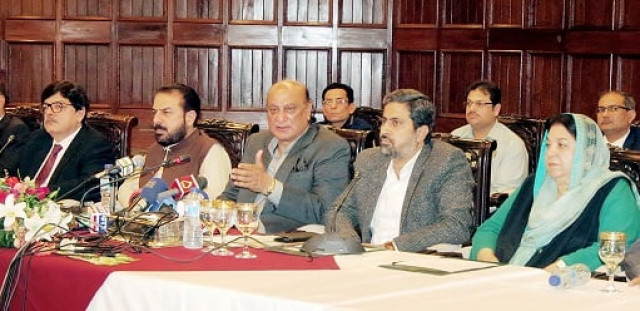Punjab govt declares health emergency amid coronavirus threat
The decision from Punjab cabinet comes after receiving a briefing on coronavirus from provincial health officials

The decision to declare health emergency was taken by the Punjab cabinet on Thursday after receiving a briefing on the novel coronavirus from provincial health officials.
Punjab Cabinet's decisions & briefing on #coronavirus:
— Government of Punjab (@GovtofPunjabPK) March 12, 2020
• Health Emergency declared
• 3,964 Zaireen of Iran screened & under observation
• Quarantine established in DG Khan for 800 Zaireen (Iran)
• Chinese citizens screened
• Ministerial Committee to decide further actions
The cabinet was informed that as many as 3,964 Zaireen who returned from a pilgrimage in Iran have been screened and kept under observation. A quarantine facility has been established in the southern Punjab district of DG Khan for 800 pilgrims from Iran.
The cabinet was also informed that Chinese citizens in the province are also being screened for the mysterious contagion. A ministerial committee has been assigned to decide further actions.
A day earlier, WHO Director General Tedros Adhanom Ghebreyesus officially declared the outbreak of the novel coronavirus a global pandemic.
“We are deeply concerned both by the alarming levels of spread and severity and by the alarming levels of inaction. We have therefore made the assessment that COVID-19 can be characterised as a pandemic,” he told a news conference.
Four countries – China, South Korea, Iran and Italy – account for 93% of the nearly 110,000 cases worldwide, Tedros said. “We are encouraged that Italy is taking aggressive measures to contain its epidemic and we hope that those measures prove effective in the coming days,” he added.
What does the pandemic label mean?
“Due to the widespread of COVID-19, the disease caused by the mysterious virus, across the globe, the WHO wants to highlight the importance for countries to strengthen their preparation and response for imminent community spread,” said State Health Minister Dr Zafar Mirza.
245/ @WHO has characterized #coronavirus as a pandemic. What does this mean?
— Zafar Mirza (@zfrmrza) March 11, 2020
Due to the widespread of #COVID19 across the 🌍, WHO wants to highlight the importance for countries to strengthen their prep and resp for imminent community spread. The gist of this is following 👇🏾
Explainer: All you need to know about ‘pandemics’
This means the world can “still change the course of this pandemic, by detecting, testing, treating, isolating, tracing, and mobilising their people in the response”, he wrote on his official Twitter handle.
“The countries need to scale up their emergency response by communicating with the people about risks and how to protect the public,” he added.
246/ The 🌍 can still change the course of this pandemic, by detecting, testing, treating, isolating, tracing, and mobilizing their people in the response. Countries needs to scale up the emergncy resp by communicating with the people about risks and how to protect the public.
— Zafar Mirza (@zfrmrza) March 11, 2020
About Pakistan, where 21 cases have officially been confirmed, Dr Mirza said the federal and provincial governments have been working in sync for the past seven weeks to implement the broad cardinals of preparedness and response as the WHO DG has highlighted.
“We will inshAllah continue to work to keep the flag of Pakistan safe from coronavirus,” he added.
247/ In Pakistan, the federal and provincial governments have been working in sync for the past 7 weeks to implement the broad cardinals of preparedness and response as DG @DrTedros has highlighted. We will inshAllah continue to work to keep Pakistanis 🇵🇰 safe from #coronavirus
— Zafar Mirza (@zfrmrza) March 11, 2020
Meanwhile in Balochistan, which shares a border with Iran – one of the worst hit countries by the coronavirus – Provincial Minister Sardar Yar Mohammad Rind said all schools would remain closed till March 31 as a precautionary measure.
“Action will be taken against schools that do not comply with the decision which has been taken after consultation with the health ministry,” he added. “Matric exams have been postponed. We’re in talks with to shut madrassahs as well. A decision regarding reopening of educational institutions will be taken on March 27.”
In Sindh, where most of Pakistan’s coronavirus cases have been reported, the provincial government spokesperson denied claims the administration was hiding information regarding the spread of the mysterious contagion.
“The Sindh government is not hiding any information about coronavirus or the number of patients in the province,” Barrister Murtaza Wahab told journalists in Karachi.


















COMMENTS
Comments are moderated and generally will be posted if they are on-topic and not abusive.
For more information, please see our Comments FAQ